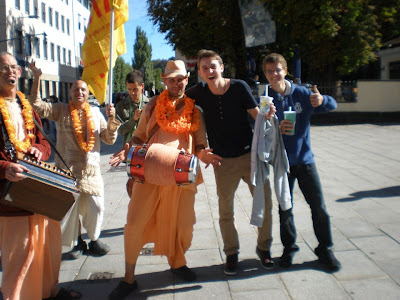Diary of a Traveling Sadhaka, Vol. 8, No. 18
By Krishna-kripa das
(September 2012, part two)
Ukraine Festival, Bavaria, British Harinamas
(Sent from Gainesville, Florida, on December 3, 2012)
Apologies
I have been so busy proofreading, doing evening programs, and going on additional harinamas and kirtana events, I am two months behind on this journal. I hope to really focus on it and catch up by the end of the year and not fall behind next year.
Where I Was and What I Did
The last half of September was wonderful because of all the good spiritual association at the Ukraine festival, where I collected many jewels from the swamis to share with you. After that Trevor, my harinama and traveling partner, and I went to Warsaw for Radhastami. I continued on to attend the last two days of the 30th anniversary of the installation of Prahlada-Nrsimha at Simhachalam, our Bavarian Hare Krishna farm, which ended with the first annual Passau Ratha-yatra. Then I flew to London where the book distributors shared their realizations from their Radhastami book marathon. The next day I began traveling with Janananda Goswami and his followers, doing harinama in and around Manchester, England, for the beginning of the World Holy Name Festival. I offer thanks to Vishnujana Prabhu for the photos of the Ukraine Festival and the Passau Ratha-yatra.
The insights this time begin with Srila Prabhupada quotes from books and lectures, and includes nectar by lots of swamis attending the Ukraine festival, such as Bhaktivaibhava Swami, Bhanu Swami, Candramauli Swami, Devamrita Swtami, Indradyumna Swami, Niranjana Swami, Prahladananda Swami, and Sivarama Swami. There are also notes from Warsaw’s Radhastami and Bavaria’s Prahlada-Nrsimha installation anniversary festivals. As usual, there is material from Satsvarupa Dasa Goswami’s journal and his books, this time including lots of prayers, and there are lectures by Janananda Goswami in The North of England as well.
Itinerary
Dec. 3–5, 2012: Gainesville, FL
Dec. 6, 2012: Jacksonville, FL (UNF)
Dec. 7, 2012: Philadelphia and New York
Dec. 8–9, 2012: Satsvarupa Dasa Goswami Vyasa-puja
Dec. 10–23, 2012: Serving SDG in Stuyvesant, NY
Dec. 24–25, 2012: Visiting family in Albany, NY
Dec. 26, 2012–
Jan. 7, 2013: harinama in New York City
Jan. 8–April 2013: Gainesville, FL (with visits to Tallahassee and Jacksonville)
Bhakti Sangama (Ukraine Festival) 2012
I went to the Ukraine festival for the eighth consecutive year. Formerly in Odessa, the last few years, it has been held outside Evpatoriya, on the coast of the Black Sea, an hour or so from Simferopol, in Crimea. The festival has many nice features for me. Niranjana Swami, who invited me to live in the NYC temple back in 1979, is almost always there, and it is always nice to see and hear from him.

Many other swamis I know and like also come there regularly. This year Bhaktivaibhava Swami, B. B. Govinda Swami, Candramauli Swami, Devamrita Swami, Indradyumna Swami, Prahladananda Swami, and Sivarama Swami were also there. This year Madhavananda Prabhu came for the first time. There are three hours of kirtana every night. The last three years Madhava Prabhu has come to participate in that. I know some of the devotees from Indradyumna Swami’s Festival of India in Poland, and it is nice to see them again. Satsvarupa Dasa Goswami, my diksa guru, has some disciples there who are always coming out with new titles in Russian, and it nice to encourage them in their service. Every year more people come to the festival, and this year there were 7,000. The devotees have such a nice service attitude there, I always feel very welcome. The weather was perfect every day this year, sunny and warm. There are so many good speakers, you can never attend all the seminars you want to, but you always hear lots of spiritual knowledge you can apply in your life and share with others, and you can find some of it under “Insights” below.
I got to talk to some of the swamis I have known for years, and Candramauli Swami and Prahladananda Swami encouraged me in my program focusing on just a couple places and trying to assist with our outreach there, as Niranjana Swami, my siksa guru, advised me. The places I choose are Newcastle in The North of England, by the invitation of Janananda Goswami, and Gainesville, Florida, my home for several years.
At the Ukraine festival, the morning program kirtanas, especially guru-puja, and the evening kirtana, are so powerful with many devotees participating and are always a highlight for me. During guru-puja I would recall how Srila Prabhupada came to Moscow and talked to one Russian, who became a devotee, and now in Ukraine, part of the former USSR, forty years later, there is a yearly festival with seven thousand people and in Russia a festival with over ten thousand people. Such is the influence of the pure devotee of the Lord. It was spiritually very enlivening to witness that amazing result.
Harinamas from Ukraine to Germany
Andre, who we knew from the Polish tour and other Ukraine festivals, kindly arranged us a ride to the Simferopol train station with devotees in a car with plenty of room and horsepower. The two devotees who came with us did not know English but had an iPad with Russian-English translation and communicated to us in that way. After we loaded our bags on the train, I decided to chant for the twenty minutes on the platform before we left. The two devotees who brought us there sang along for several minutes before going on their way. Several people looked with curiosity and some took pictures. The conductor motioned it was time to get aboard when there was still almost ten minutes till the train was to leave, but at least some harinama went on. At the first lengthy stop on the train, Trevor and I chanted for ten minutes or so, as people bought and sold things, smoked cigarettes and got some fresh air during the break, and again, a few people looked with curiosity and took pictures, and no one hindered our chanting.
Three or four times on the trains to and from the Ukraine festival, I would get out and chant like this when we stopped for fifteen minutes or more. No one protested, although occasionally, the conductor indicated it was time to get back on the train five or ten minutes early. Some people would always stand and listen, others would smile, and still others would take pictures.
The several times I have crossed the border from Shegyni, Ukraine, to Medyka, Poland, there has always been a minibus waiting to take people to the Przemysl train station to continue their journey through Poland. This time there was just a crowd of people hanging out, some of them selling liquor and cigarettes. I assumed some of them were waiting for the minibus, so I decided to play harmonium and chant while waiting. After a while, Trevor got out his karatalas, and we had a kirtana with about fifty people surrounding us. I chanted some more, and then let Trevor take over. Some people took pictures and others took movies, some for many minutes. A couple of men danced a bit. I saw a bus across the street and wondered if it went to the train station, assuming if it did, it would stop here where people were waiting. Then a lady informed me in Polish that it was the bus to Przemysl and the bus stop was across the street and some thirty meters away. We stopped singing abruptly and ran to catch the bus. As Trevor packed up his harmonium, some people gave him some kind of sugar candy as a gift. We must have chanted half an hour.
Trevor stayed in Warsaw where we spent Radhastami in the association of many friends from the Polish tour. I continued to Simhachalam for the end of the 30th anniversary of the Prahlad Nrsimha installation.
I took a train from Warsaw to Czech Republic, changing trains in different places, including Brno, where I chanted at the station during the morning rush hour and three large trainloads of commuters got to hear the Hare Krishna mantra as they rushed to work and a bum gave a couple of small donations. I then took Czech trains to the last stop near the German border, and walked to the town of Haldmühle where I chanted with my harmonium by the side of the road as I waited almost an hour for the devotees to pick me up and drive me to Simhacalam. Two ladies came by at different times, one clearly a senior citizen. One gave a 10 euro donation and the other gave a couple euros. One of them was chanting Hare Krishna as she walked away. I was amazed to see such appreciation for the chanting in a small rural Bavarian village.
I had been on trains for seventeen hours from Warsaw to the German border, and had only done two hours of harinama, in one each in Brno and Haldmühle, so when Advaita Gauranga Prabhu, my driver to Simhachalam told me he was going on book distribution after dropping me off at the temple, I suggested I could go with him and we might do harinama at the same time. He recruited another harinama devotee and another book distributor, and I grabbed a large plate of the super excellent festival prasadam from Simhachalam, which included srikhand, one of my favorite sweets, and we drove to the nearby town of Waldkirchen, and chanted and distributed books for an hour before the evening kirtana. A few people smiled, but in general, you could understand people were uncertain and unfamiliar. I think that not too much harinama has happened in Waldkirchen. Still it was great to go out and complete my program of trying to chant three hours a day.
Passau Ratha-yatra
In my travels I see Lord Jagannatha and His associates are performing the Ratha-yatra pastime in more and more cities each year. In 2007 Ratha-yatra came to Brno, CZ, and in 2008 to Prague, CZ, in 2009 to Wroclaw, PL, in 2011 to Hamburg, Germany, and now in 2012 to Passau, Germany, the nearest city to Simhachalam, our Bavarian Nrsimha farm.
Hare Krishna guru and scholar, Krishna Ksetra Prabhu, seen playing harmonium above, blessed the event by his presence, and there were a number of devotees mostly from Germany, Czech Republic, and Poland.
People at the sidewalk cafes were attracted by the unusual site of Lord Jagannatha and His cart, and His associates.
I was with my friends Vishnujana and Gaura Karuna Prabhus, who really like harinama, and we chanted around Passau both before and after the Ratha-yatra for practically an hour each time.
Soho Street Devotees Remember Their Radhastami Book Distribution Marathon
Saci Kishore Prabhu:
I do not have the ability to convince people take books. But doing book distribution is an opportunity for me to see Krishna working His magic.
Bhakta Lawry:
I was distributing books at one location where there was a man on the roof who was threatening to jump off and a crowd watching. There were people who were shouting “Jump. Jump.” I couldn’t believe it. I distributed books for several hours. Then I heard a scream when the person actually jumped. One man who passed by later said, “I missed all the fun.” I was shocked to see how people were so degraded they were taking pleasure in man’s mental anguish and suicide. This age is becoming worse and worse.
Bhakta Alexi:
I met two people who were dumb and could not speak. A devotee had taught me the hand gestures for the language of the dumb. I taught them the mantra using this and they learned it. They gave a donation and took a book.
World Holy Name Festival, Part I
Once a year, usually in September, the Hare Krishna movement really tries to increase its program of congregational chanting, both in the temple and outside. Janananda Goswami, my authority in The North of England, is committed to harinama, the congregational chanting of Hare Krishna in the streets of the towns, and he invited me to travel with him in The North of England and Scotland during The World Holy Name Festival this year.
Janananda Goswami really likes to go to places that we rarely or never go to and to small places, into addition to the metropolitan areas where we often chant.
One day, traveling between Manchester and Liverpool, we chanted in St. Helens and Prescot. I rarely distribute books, but in St. Helens, a couple people were so attracted by our kirtana, that even I was willing and able to sell them books.
Most amazing was a well attended Saturday harinama in Leeds, where we had so many enthusiastic devotees chanting on harinama that I was able to distribute five books without much endeavor.
Sunday, September 30, was my birthday, and I bought ingredients at the local shop to make laddus for the Manchester Sunday feast, as an offering to purify my birth. They came out really good by Krishna’s mercy. Janananda Goswami was so generous that he encouraged the congregation to support my program of traveling and doing harinama, and they were so kind, I got enough to pay over half the cost of my ticket to the USA and back for another summer in the UK. I thank all the Manchester congregation who kindly helped out in that way.
Insights
Srila Prabhupada:
from a purport to SB 5.12.13:
The pure devotee is never interested in material topics. Sri Caitanya Mahaprabhu has strictly prohibited His devotees to talk about worldly matters. Gramya-varta na kahibe: [Cc. Antya 6.236] one should not indulge in talking unnecessarily about news of the material world. One should not waste time in this way. This is a very important feature in the life of a devotee. A devotee has no other ambition than to serve Krishna, the Supreme Personality of Godhead. This Krishna consciousness movement was started to engage people twenty-four hours daily in the service of the Lord and in His glorification. The students in this institution engage in the cultivation of Krishna consciousness from five in the morning to ten at night. They actually have no opportunity to waste their time unnecessarily by discussing politics, sociology and current events. These will go their own way. A devotee is concerned only with serving Krishna positively and seriously.
from a conversation with a guest, August 1973, in London, quoted in Back to Godhead, Vol. 46, No. 6, Nov./Dec. 2012:
“When you paint a flower with a brush, the brush is not the creator of that painting—you are the creator. Similarly, in the creation of a real flower, nature is only the brush, but the creator is God.”
from a lecture on Bhagavad-gita 9.15 in given in New York City on December 1, 1966, quoted in Back to Godhead, Vol. 46, No. 6, Nov./Dec. 2012:
We are very much proud of seeing, but as soon as the light is turned off, we cannot see. So our seeing is conditional. All our senses are conditional. Therefore they are imperfect. . . . Nobody can become a representative of Krishna, or God, without becoming His devotee. One who thinks “I am God” cannot become the representative
of God. Suppose you are a businessman and you send your representative to secure business. If he represents himself to the customer, “I am the proprietor,” how long can he continue? As soon as the master knows “This foolish man is representing himself as the proprietor of this firm,” he will cancel his employment at once. Because the so-called representative is cheating; he’s not the proprietor. Similarly, anyone who says “I am God” should not preach. . . . You cannot preach, “I am God.” Because if you promote yourself as God, then people may ask you, “If you are God, then show me your allpowerfulness.” That you cannot show. So you cannot preach, “I am God.”
from a lecture on Srimad-Bhagavatam 1.2.6 given in London on July 23, 1973:
One can ask questions of the guru once one has fully surrendered. Otherwise it will not act. Don’t waste your time.
In the beginning Arjuna has friendly talks with Krishna, but nothing was solved, and so Arjuna surrendered to Him as a disciple.
from Srimad-Bhagavatam 5.13.25, purport:
The whole world is revolving under the bodily conception; therefore there must be devotees all over the world to deliver people from the false bodily conception and fully
engage them in Krishna consciousness.
from Srimad-Bhagavatam 5.14.2, purport:
This Krishna consciousness movement is therefore teaching people to control the mind and five knowledge-acquiring senses by a definite process. One should practice a
little austerity and not spend money on anything other than the regulative life of devotional service. The senses demand that one see beautiful things; therefore money should be spent for decorating the Deity in the temple. Similarly, the tongue has to taste good food, which should be bought and offered to the Deity. The nose can be utilized in
smelling the flowers offered to the Deity, and the hearing can be utilized by listening to the vibration of the Hare Krishna mantra. In this way the senses can be regulated and utilized to advance Krishna consciousness.
Bhaktivaibhava Swami:
Incidents when we call out to Krishna and He protects us make our faith strong, but when we see so many people engaged in materialistic activities and we are very few, we may again have some doubt. These festivals where thousands of devotees chant together are therefore valuable. Actually this movement is meant for the masses. The more people join, the more ecstatic it becomes. This movement is meant to drown the entire world in the holy name.
Bhanu Swami:
In the material world, if we do not like our master, we can run away and find another master, but we can not run away from our eternal master, Krishna.
The master expresses gratitude for service, and the relationship is one of respect and love.
Sometimes people think that Krishna wants to exploit His servants like happens in the material world.
Krishna is master because He is the supreme controller and He knows everything.
When we say master, when mean a person, not an entity with no personal qualities.
Krishna does not need anyone or anything because he is made of bliss. Yet because he is compassionate, he shows perfect love.
Krishna reciprocates according one’s surrender and one’s favorable attitude. But because He is independent, He can break all the rules and show extraordinary mercy to an unqualified person as with Putana.
Krishna does not hate the demons—he enjoys fighting with them and He purifies them.
The prison is a manifestation of the government which is an attempt to reform the prisoners, although the prisoners may not appreciate that.
The Lord shows special compassion to those who recognize themselves as servants of the Lord.
Those who follow no rules for elevation are considered uncivilized. Better than them are those who follow the varnasrama guidelines or the karma-kanda path, but still their goal is the material world, and so the jnanis and yogis are better because their aim is beyond this world. The devotees are beyond these.
Krishna is not eager to give benefits that will disturb a person’s devotional service.
Krishna prefers pure devotional service, but he considers contaminated devotional service better than no devotional service. The mixed devotees get better reciprocation from Krishna than either the karmis or jnanis, but not the ultimate perfection that comes from pure devotional service.
Bhakti is the desire to please Krishna and nothing else.
When we perform sadhana, we are not trying to get something from Krishna for ourselves.
Sometimes people mix elements from other practices in with our bhakti, and if these do not obstruct the bhakti, they are not a problem.
Bhakti can also be mixed with the three modes of material nature, if we have motivations. The mode of ignorance causes us to harm others, the mode of passion causes us to desire material enjoyment.
In prema the devotee gives himself completely to Krishna, and Krishna gives Himself to the devotee. That is the highest bliss in which both the Lord and the jiva are satisfied.
Because Krishna is complete, the servant and master relationship transforms in different ways, with Krishna becoming equal as a friend, with Krishna becoming inferior as the son of Yasoda, or of Krishna surrendering completely, as with Radha. Still all the while Krishna remains the master and the devotee is the servant.
Vishnu is not a lesser God than Krishna because there is only one God. Vishnu has all the qualities of Krishna, but He does not manifest them in the form of Vishnu. Just as when you go to work, you show some qualities to your boss, but at home, you show more qualities to your family.
Shiva is isvara, the Lord, not jiva, an ordinary living entity, but he manifests fewer qualities than Vishnu, and therefore, is not on the same level. Although he appears to be contaminated by the mode of ignorance, having long hair and living near the crematorium, he always isvara, the Lord, and therefore factually transcendental to the modes of nature.
Saktyavesa-avataras, or empowered jivas, being jivas, are always servants, and thus can never become the Lord.
The conclusion is that Brahman and Paramatma exist and are included within the Lord and His name, and thus we can realize all these features of the Lord by chanting His holy name.
We should not accept food offered to the devatas (demigods) alone.
Demigods can be pleased by offering them the prasadam of Lord Vishnu.
Strictly speaking, Vishnu does not come from Krishna, nor Krishna from Vishnu, for they are both eternal. We say expansion because the expansion manifests fewer qualities.
Each Veda has four divisions: samhitas, brahmanas, aranyakas, and upanisads.
To blaspheme the scriptures or to come to the wrong conclusion about them are two ways we offend the scriptures.
The universal form of the Lord describing His bodily parts as features of the universe seems to be symbolic.
Candramauli Swami:
Prahlad Maharaja is embarrassed that Lord Nrsimha wants to offer him a benediction because he is happy serving.
It is the position of the living entities to be happy in service but that gets covered in the material world if we think of ourselves as only serving in a particular way.
Bhaktisiddhanta Sarasvati Thakura, when asked how many disciples he had, said none. They are all his teachers, and he learns something from each.
Balarama serves Krishna is each of the five rasas. In neutrality as the Lord’s paraphenalia and in conjugal love as Ananga Manjari.
Without concern for the object of service, it becomes routine.
When Lord Nrsimha persisted in offering a benediction to Prahlada Maharaja he asked to remain here to benefit the souls.
Four things block our progress in bhakti, the devotional service of the Lord:
1. Philosophical misconceptions.
2. Pious activities.
3. Impious activities.
4. Offenses.
According to Visvanatha Cakravarti Thakura in his Madhurya Kadambini:
Misconceptions about bhakti are partially removed at bhajana-kriya, completely removed at nistha, and will not return at the stage of ruci (taste).
Sinful and pious desires are almost completely removed at bhajana-kriya, completely removed at nistha, and will not return at the platform of asakti (attachment).
Offenses are partially removed at the stage of bhajana kriya (spiritual practice), greatly removed at nistha (steadiness), almost completely removed at bhava (preliminary love of God), completely removed at prema (love of God), and will not return when one has attained shelter at the lotus feet of the Lord.
Jaya and Vijaya are evidence that offenses can still arise even at the stage of love of God.
We must become adosa-darsi, one who does not see the faults in others.
Harinama sankirtana can destroy all anarthas.
Bharata Maharaja’s defect was he did not have regular association with the devotees. If he did, seeing him so attached to the deer, they would have said, “Hey Bharata, you are in maya [illusion]!”The holy name is Krishna, but Krishna is coming and going according to our consciousness.
There are so many things we can say about Krishna:
Krishna was born on Wednesday.
Krishna’s favorite sweet is rasgulla.A nice exercise is to read something about Krishna and share with others each day.
Bhaktisiddhanta Sarasvati Thakura said chanting without krishna-katha, is like Krishna without Radha (His internal potency).Someone once requested Srila Prabhupada, “Please give me your mercy.” Prabhupada responded, “I am giving everyone my mercy. Just take it.” Association of the devotees is mercy, prasadam is mercy. Just take it.There are two kinds of ruci. One in which one has a taste for hearing the kirtana if the melody is nice and the singing is nice, and one in which one has a taste for hearing the holy name regardless of the quality of singing or the melody.We may make special endeavors to make Krishna available for others, but for ourselves, we do not make special endeavors for basic needs.
If Krishna wants, He provides what you need, and if he doesn’t provide, it just means that you did not need it, or you did not need it at that time.
Devamrita Swami:
Love of God is so exalted that even if it takes many hundreds of births to attain, it is still worth the price.
We are like children who do not know what we want, but it is difficult to admit that.
Once we understand that Krishna is the Supreme Enjoyer, we should also understand that He knows how to get the greatest love.
Yasoda never accepted that Krishna lifted the hill. She thought His father did it.
In the spiritual world, there is so much crying, anxiety, and pain, but it is all ecstatic. Do you still want to go?
You will learn how to be in anxiety in ecstasy, how to cry in ecstasy, and how to suffer the pain of separation in ecstasy.
Krishna is the butter thief, and Balarama is His assistant.
Krishna does not steal milk products because He wants to eat them, but rather because He just likes to steal.
Yasoda did not see the universes in Krishna’s mouth but in His belly, according Lord Brahma. Visvanatha Cakravarti Thakura said there was dirt His mouth as well as the whole universe, but seeing the entire universe distracted Yasoda from noticing the dirt.
The pure devotees’ accusations against Krishna are based on pure love, but our accusations against Krishna are based on frustration of material desires.
Q: Krishna’s pastimes sometimes seem like fairy tales.
A: Actually material life is a fairy tale. If you get this and that, you will be happy. Isn’t it a fairy tale?
Death for a devotee is a change of service. It may look like the death of a nondevotee just as food offered to Krishna may look like ordinary food, but there is a great difference. Srila Prabhupada used the analogy of the kitten and rat in the mouth of the cat to illustrate this point. The kitten feels protection in the mouth of the cat while the rat feels fear and imminent death. The body gets to the point where it cannot serve Krishna anymore. Why should we want to maintain it, if it can not longer serve Krishna?
Neophytes consider fulfillment of their desires for sense gratification to be Krishna’s mercy. But we should consider that Krishna’s mercy acts to increase our devotional service.
Krishna does not want us to enjoy material things because He has better things to give us but we are so stubborn, we do not believe it.
There is a story of a kid whose parents were so proud of their child’s devotion to Krishna they told the kid to give me his favorite toy truck. He came right up to me, but at the last moment, he could not do it and started crying. The parents thought he was just attached to that truck, so they arranged he give away a brand new truck, but at the last moment, he could not give that away either without crying.
Although a child, Prahlada knew the cause of spiritual destruction, material desire. He understood that not by experience gained in life but simply by hearing from his guru. Sometimes we have difficulty understanding that experience acquired through hearing is also experience.
Material desire is not some innocent thing but the cause of our ultimate destruction.
Srila Prabhupada explained in Bombay in 1977 that guru-puja is not just some ritual but the receiving of divine knowledge from the guru.
Krishna is expert at purifying devotees who have material desires. If Krishna could handle Kubja, He can handle you. Kubja was filled with desires to enjoy with Krishna in an materialistic way, but as she approached Him to embrace Him, she was purified of all material contamination by smelling the fragrance of His feet, and then she embraced Him as a completely liberated soul. If we cooperate with Krishna’s program, He can expertly purify us.
Indradyumna Swami:
Human life begins when we inquire beyond the body.
Because Krishna is unlimited, there are unlimited questions we can ask about Him. Unfortunately, we do not even know what to ask, so the great spiritual teachers teach us
Krishna consciousness is presented to us on a silver platter, but we do not take it.
Unless we know who we are, we cannot conduct our lives to live in a better way.
We should have learned at five years old that we are not our bodies but servants of Krishna.
As Srila Prabhupada is our ever well-wisher, we should be ever grateful.
Janananda Goswami:
There is nothing more powerful in life than love and devotion.
People are attracted to Hare Krishna because it touches something deeper in the heart.
The Bhagavad-gita wasn’t understood in the West for centuries for to understand it you have to practice the instructions in it.
Drama as “Rama” in it.
It is important to know how to apply knowledge.
Paul McCartney’s office is around the corner from our Soho temple, and he would regularly take prasadam.
Ananta Caturdasi is famous in South India in the Sri Sampradaya as the appearance day of their worshipable deity of Padmanabha.
The circumstances of the birth of Haridasa Thakura are not known in certainty or how he came to point of chanting 300,000 names of Krishna per day.
After the Brahma-vihomana-lila, Brahma went to Navadvipa and performed austerities desiring to be purified from his pride. Lord Caitanya appeared and said during His next appearance, Brahma would appear from a low-born family as Haridasa Thakura, and teach by his example that there is no material disqualification for chanting the holy name. In this way, it can be said that Haridasa Thakura was initiated into the chanting of the holy name and given the name Haridasa Thakura by Lord Caitanya before his appearance.
Haridasa Thakura appeared about 36 years before Lord Caitanya, according to Bhaktisiddhanta Sarasvati Thakura.
Haridasa Thakura exemplified Lord Caitanya’s “Siksastakam,” be humble and tolerant, and no matter what, keep chanting.
Although Haridasa Thakura forgave Gopal Cakravarti for his offense, Gopal still had to suffer because he had defamed Haridasa Thakura in public. Had he made a public apology and had he glorified Haridasa Thakura to the same extent as he defamed him, he could have been completely relieved from any reaction to the offense.
With the strong association of devotees, the impossible can become possible.
Sannyasa means never alone, always remembering that Krishna is present.
Q: Some people says that the title “Goswami” is given to those who were previously married and then took “sannyasa” while the title “Swami” is given to sannyasis who were never married before. A: As far as the sannyasis Srila Prabhupada initiated, that is not true in every case. Srila Prabhupada writes in a purport that the name does not change at sannyasa.
Sannyasa is a state of mind not just an order. You can be a grhastha and much more renounced than a sannyasi.
The consciousness that must be developed, whether one officially takes sannyasa or not, is to become more dependent on Krishna.
We have found millions of things to eat on Ekadasi. Devotees have discovered many tasty preparations without grains. You do not need to eat grains.
Five hundred Gitas were sold to a crowd of mostly students at the Boston hemp festival which coincides with the Hare Krishna festival in Boston for the anniversary of Srila Prabhupada’s original arrival in Boston in 1965.
The record in a gulabjamun eating contest in my experience was a mataji by the name of Subha-laksmi who ate 96 gulabjamuns in one sitting.
Once I ate two trays of laddus with 70 laddhus on each tray. It was very cold and the others were jumping up and down outside the van to stay warm. My duty was to look after the van, and noticed the three trays of laddus.
Bhaktivinoda Thakura said, “My only hope lies in the limitless nectar of Your holy name.”
Srila Prabhupada likened the appearance of Lord Jagannatha in the memories of a dying man who had seen a Ratha-yatra to a bright light that exposes the film of all his karmic reactions.
It is said if you go to a new place where harinama has never gone before that Bhaktivinoda Thakura personally accompanies you.
In one city where we had not done harinama for years, one person was very emotional upon seeing the devotees on the harinama party. He grabbed one devotee and pushed him up against a wall and shook him. The devotee was worried, but the man, said excitedly, “Where have you been? I have not seen you for twenty years!”
Srila Prabhupada explains that whether they want to hear or not, the chanting will create an auspicious atmosphere for everyone.
Niranjana Swami:
Seminar on Patience:
Devotional service is easy if one is fixed on the goal.
Pure bhakti means no other desires.
The impatient cannot perform the work of sadhana, although they may be able to work some job.
Karmis want material gain, jnanis want liberation and yogis want mystic powers, but the devotee just wants Krishna to be pleased. Without pure devotional service, it is more or less a show.
Bhaktivinoda Thakura explains that one who is not sufficiently patient may fall from the path of pure devotional service. The patient devotee thinks, “Krishna must be merciful to me today, tomorrow, or in another birth.”
Those with firm faith continue performing devotional service.
The patient person first controls himself and then the whole world.
Raghunatha Dasa Thakura’s father, Govardhan, always protected him from seeing the evils of this world. Once Govardhan sent Raghunatha to Haridas Thakura, along with a cartload of material amenities, to get a benediction. Balaram Acarya was a follower of Haridas Thakura and knew the kind of benediction that Haridas Thakura could give. After Raghunatha Das Goswami asked for a benediction, he made a loud sound so others could not hear the benediction which Haridas Thakura gave, which was to be completely detached from this material world. When Govardhan asked what the benediction was, no one could say. When Govardhan directly asked Balaram Acarya the benediction Haridas Thakura gave, and Balaram Acarya said, “Your son will be able to control the whole world.” Govardhan was impressed. He only controlled a tract of land, but his son would control the whole world. Actually this was true, because Raghunatha Das was detached from this world, he was in control of himself, and the world could not control him. And thus he could control the world.
Actually we can control the tongue simply by speaking about Krishna, but there are situations when it is difficult to speak about Krishna.
It is significant that Verse 1 of Upadesamrita describes the person who can tolerate the urges not the person who does not have the urges. Bhaktivinoda Thakura says that one who cannot tolerate these urges and acts on them can never have peace.
When Krishna steals the butter and does other childhood pranks, the ladies of town come to Mother Yasoda to talk about Krishna, on the pretext of complaining Him.
Where topics of Krishna are flowing, then the material necessities of life are not even noticed.
Getting together and talking about others is natural, and talking about others is perfected in talking about Krishna.
Sometimes when we speak about others, we do so to establish ourselves as superior to others. Thus before we start speaking, we should consider carefully our motives in speaking.
If one speaks unnecessarily and does not tolerate the urge to speak, his mind will never be so peaceful he can fix it on Krishna.
Bhaktivinoda Thakura says that talking about others should be rejected in all respects, but there are some favorable topics that are so pure that even though they are about others they can be spoken about.
He explains it is best for householders to live in a Krishna conscious family and not talk about others without reason.
A guru can use others as an example to make a point clear to the disciple, if done without envy or desire to be superior.
Sukadeva Goswami’s warning about envious householders who sleep and have sex and night and maintain and decorate their bodies during the day, and Lord Caitanya saying he cannot tolerate seeing the face of a member of the renounced who talks intimately with women are examples of using others to make a point clear.
If one speaks for the purpose of instructing others then it is not prajalpa, unwanted and degrading talk that blocks devotional progress.
If our speech about others is contaminated by envy, hatred, pride, or distinction, then it is an offense against Bhakti Devi.
When we ignore this good advice, we can create enmity and disturb minds, and create an atmosphere which is not conducive to development of Vaishnava relationships. People become afraid to reveal their minds, thinking whatever they say will become public knowledge.
We have practice patiently the control of our own urge to speak, instead of telling others how to control theirs.
The goal of the sadhaka is to see that Krishna is pleased. When is Krishna pleased? When the devotee follows His instruction, man mana bhava mad-bhakto . . . When the devotee has no shelter but Him.
The Lord gives his heart to His devotees, and therefore He could not help Durvasa Muni, who had offended His devotee.
If there is envy (malice) in our heart, then how can we work for the benefit of others?
Practitioners of devotional service should not speak unnecessarily.
There is no restriction on glorifying the devotees.
Lord Caitanya advised an offender who criticized devotees that he could become free from offense by using the same mouth to glorify devotees.
Sometimes people glorify their friends who are devotees in a very lofty way. This calls to mind that King Prthu rejected the glorification by the professional reciters for qualities of his that he had not manifested, saying that that such praises were actually insults.
I went to the kitchen to encourage the devotees who do so much work there during the [Ukraine] festival. I saw one devotee who was washing all the buckets that were used to serve prasadam. It looked like he had been there for a long time, and that he would be there for a long time still. I asked him if there were any difficulties in his service. He replied that his difficulty was that they were only allowing him to wash the buckets for one day.
The regulative principles of bhakti-yoga does not mean the vows we accepted at initiation. Those are the regulative principles of human life. The regulative principle of bhakti-yoga is to always fix the mind on Krishna. If one cannot fix one’s mind on Krishna twenty-four hours a day, at least some part of the day one should fix his mind on Krishna.
Prahladananda Swami:
Astrology is meant to help one move toward liberation and was given by Parasara Muni.
By liberation, I mean freedom from misconceptions.
I memorized the Krishna book because I thought it would be less boring to remember Krishna’s pastimes while I was chanting japa. I wrote Srila Prabhupada asking if it was alright to remember Krishna’s pastimes while chanting japa, and he said, “No. Just chant and hear, and if you happen to think of Krishna’s pastimes spontaneously that is all right.”
To be successful in devotional service we must simply understand who is the right source to hear from and what is the right attitude to hear with.
Maya has no power to hold on to us, but we are holding on to maya, and why are we holding on to maya? Because we like to hold on maya. But it is not enough to let go of maya, we must embrace Krishna.
The pure devotee sees everyone suffering because of being separated from Krishna.
In astrology there are three kinds of planets, male, female, and neutral. Male planets are concerned with doing the right thing. Female planets are concerned with enjoyment. The female does the right thing when she is happy, and the male is happy when he does the right thing.
The sun is very generous. No one gets a bill for heat and light from the sun. It is very regulated. It always rises every morning and never sleeps in.
The planets have a higher and lower nature. The sun is generous and noble on the positive side, and on the negative side pride or depression result.
The sun, Mars, and Jupiter are male. Venus and the moon are female. Mercury and Saturn are neutral. The world is set up so the combination of influences has a balancing effect. One lives nicely in this world, but wonders, “is there anything more than this?” and then inquires about Krishna consciousness.
Satsvarupa Dasa Goswami:
from his journal, Viraha Bhavan, August 26, 2012:
I read a lecture by Bhaktisiddhanta Sarasvati Thakura which gave me a great enhancement in chanting. He said the goal of life is to render service to Srimati Radharani, the attractor of Krishna. And the best way to do this is by nama-bhajana to the Hare Krishna mantra. The word “Hare” is the vocative form of “Hara,” which indicates Radha. And “Rama” means Radhika-Ramana, the lover and enjoyer of Radharani. So the entire mantra is yugala kishora, the joining and separation of Radha and Krishna, which is how Lord Caitanya chanted.
from My Dear Lord Krishna:
“Please let me serve You and love You in my next life. I will have to serve something or someone
—some nation, etc. I ask that it be You. I don't want to be born in the darkness of ignorance. I want my eyes opened by the torchlight of knowledge carried by my spiritual master. I had to wait twenty-six years in this life before I began serving You. It was wonderful when I began, but it was too long to wait. I almost died before I met Prabhupada. Please don't let anything like that happen to me in my next life. Let me get a speedy start. Let me begin chanting Hare Krishna Hare Krishna Krishna Krishna Hare Hare, Hare Rama Hare Rama Rama Rama Hare Hare as soon as possible, even in the womb of my mother. Such a thing is possible. Let me meet the first obstacles of my life with You by my side.
“Give me Krishna conscious parents, or bring me at once to the spiritual sky. I am greedy for the best. I can't claim qualification, but I'm afraid of this material world in Kali-yuga, and I'm attracted to You. So I ask to be born where You are. If You want me to come back to the material world to preach, then so be it. But in that case, give me the spark of compassion to be a preacher. Make me strong and put me in the association of strong devotees.
“Please let my next life be auspicious. Protect me from calamities. Let me be pure. Let me find my eternal spiritual master and affectionately serve him. Let me have a friendly, intimate relationship with him. Let me be of actual use to him in his mission. Let me be attracted to the eternal dhamas, such as Vrndavana and Mayapura, and render service there and purify myself there and associate with devotees. Let me practice brahmacarya. Let me not be attracted to material objects like beautiful women, opulent food and clothing, and fine residential quarters. Let me live simply.
“Let me do some creative service for You, if You desire. Let me work for You. Wherever I am, let me think of You with devotion. I would like to feel ecstatic symptoms of love of God. If I am in a position where I have to defend Your good name in the world, give me the courage to do so.
“These are some thoughts that come to my mind about how I would like to relate to You and Srimati Radharani in my next life. Let me know raganuga sadhana bhakti. Give me time to read and relish the scriptures and speak about them to others. I want to be a faithful devotee wherever I live. Let me be happy in Krishna consciousness. I think it is right to aspire for going back to Godhead, as Srila Prabhupada encouraged.
“Let me be with You,
let me love You,
please accept me
as Your humble servant.”
Sivarama Swami:
This world seems real because it is a reflection of the spiritual world.
One must have great faith in Krishna’s divinity to be able to understand His pastimes in which he does things that in this world that would be unacceptable behavior, like His lying, stealing, etc.
Kubja is considered to be both an incarnation of Surpanakha and also the partial expansion of Satyabhama. After being rejected by Lord Ramacandra, she underwent austerities to please Lord Shiva for many, many years. Lord Shiva said he could not give her the benediction that Rama would be her husband as he accepted a vow of eka-patni vrata.
Because Kubja wanted to enjoy with Lord, her love is not considered pure. The queens because they want to give pleasure to Krishna are superior, and best are the gopis who want to please Krishna and have no conception of another self-interest.
Dhirasanta Prabhu:
We still make too many distinctions between devotees based on whether they are brahmacari, grhasthas, or sannyasis, although it is not bad as earlier in ISKCON history.
If we do our spiritual duties nicely in the morning, we will be able to all our other duties throughout the day in an exemplary way that inspires others.
I present Krishna philosophy and culture in the Hinduism classes in the school. One day one of the teachers who very passionate and who did everything very hurriedly, was acting in a very peaceful way after hearing two hours of my presentations in her classes, and her friends were amazed by the change in behavior. She said maybe it was the incense this Hindu priest uses. She said it was not something I said that affected her behavior, but the whole way I acted. I explained that every morning I chant Hare Krishna for two hours, and that gives me the spiritual strength to deal with the issues.
Bhaktivinoda Thakura sings, “Lord Gauranga said, ‘I have descended just to save you; other than Myself you have no friend in this world. I have brought the medicine that will wipe out the disease of illusion from which you are suffering. Take this maha-mantra-Hare Krishna Hare Krishna, Krishna Krishna Hare Hare/Hare Rama Hare Rama, Rama Rama, Hare Hare.’”If it was not for Bhaktivinoda Thakura, we probably would not be sitting here today.
Nagaraja Prabhu:
from Back to Godhead, Vol. 46, No. 6, Nov./Dec. 2012:
As Srila Narottama Dasa writes, “The sound of the glorification of Krishna is a gift from Goloka Vrindavana, Lord Krishna’s eternal abode.” If we immerse ourselves in that liberating sound, we won’t die either. As Prabhupada once said, at the end of our time in this body we’ll close our eyes, and when we open them, we’ll be with Krishna.
Pancaratna Prabhu:
I am from Mayapur, and Mayapur is known for festivals, and I have to say, this [Ukraine] festival is extraordinary. After Devamrita Swami’s kirtana took us to a higher level, your loud cry of “Haribol!” I do not think I had heard resounded at such a volume since the installation of the Pancatattva in Mayapur.
The Lord desired in the beginning that although one He might become many. It all begins with desire.
The Mayavadis want to be without desire, but without desire, what do we have?
We all know of the flow of desires in our minds, and without the mercy of Krishna, the guru, and the Vaishnavas, we cannot get out of the service of these desires which never can satisfy us, because they are for the temporary.
The Buddhists say by eliminating desire, we eliminate suffering, but Krishna has a better idea: “The embodied soul may be restricted from sense enjoyment, though the
taste for sense objects remains. But, ceasing such engagements by
experiencing a higher taste, he is fixed in consciousness.” (Bhagavad-gita 2.59)
Kavitam in Siksastaka 4 means fruitive activities described in flowery language.
The desire to serve the Lord does not come from the mind, but from your heart, from your actual self.
God desires. He desires love, pleasure with us. By pleasing Him we share in that pleasure.
Madhava is always reminding us, “Chant from the heart.” What does that mean? It means not for any material reason, for Krishna’s pleasure.
Srila Prabhupada taught us to chant like a child crying for his mother. Why does a child cry for his mother? Because from his mother everything comes.
We want Krishna. That is our hearts’ desire. In our chanting of the holy name, we must connect with that desire.
Bhaktivinoda Thakura says in Bhakti-rahasyam that Siksastaka 4 describes the state of no desire which happens at ruci.
Trnad . . . [tolerance and humility] is how we get to nistha [steadiness in devotional service].
Bhakta Vatsala Govinda Prabhu (from a Radhastami lecture):
Without accepting the Absolute Truth is a person we cannot understand the philosophy of Krishna consciousness.
The energies of the Absolute Truth are also persons.
Through Krishna consciousness we are trying to revive our relationship with Him.
The easiest way to attain Krishna is through Srimati Radharani.
Radha is described in great detail in literature by great devotees. She is fourteen years old, has elder brother, Sridhama, younger sister, Ananga Manjari, and many friends known as sakhis.
Radha has pets such as parrots, cows, calf, monkey, doe, birds like swans and peacocks.
Radha has ornaments like tilaka, necklaces, earrings, a medallion with Krishna’s picture, a syamatanka jewel, touchstone, bracelets, blue dress (usually, but sometimes red), jeweled mirror, golden stick to decorate her eyes, comb, mirror, private flower garden with golden jasmine flowers like lightning.
Radha-kunda with the kadamba tree where she sits and talks with Krishna. She has favorite ragas (musical arrangements) and dances. She worships the sun-god every day with the desire to marry Krishna.
We can learn from this list of possessions of Radha that the spiritual world is not so different from the material world. There are families, pets, etc. The idea that the spiritual world is completely different had by impersonalists is erroneous. Impersonalism means to take the person features out of spiritual life.
Material life is “it is all about me” everyone else is competition, and Krishna is the biggest competition, but someday I will conquer Him.
In the spiritual world all the things that are inanimate in this world are conscious there. Thus we have to act consciously with every person and thing.
Krishna is already ready to help us attain the spiritual world, but the question is are we willing to follow His advice.
Vamsivihara Prabhu:
from Back to Godhead, Vol. 46, No. 6, Nov./Dec. 2012:
Everyone loves certain foods, drinks, clothes, and music, and Lord Krishna is no exception. In fact, we have our likes because we are parts of Krishna, who has His own personal likes. Krishna loves butter, yellow clothing, peacock feathers, cows, flutes, and the land of Vrindavan. Similarly, of all months, He loves Karttika the best.
When devotees see the master of the entire universe bound by the love of His devotee, their hearts are filled with extreme gratitude. Attracted by Krishna’s divine qualities, their hearts are uncontrollably pulled toward Him. Although devotees do not wish to subdue the Lord, He takes extra pleasure in being ordered and controlled by His devotees. Each tries to be controlled by the other, because where love is present, happiness lies not in winning but in being won over. Srila Prabhupada writes in his purport to Srimad-Bhagavatam (6.16.34), “The Lord and the devotees both conquer. The Lord is conquered by the devotees, and the devotees are conquered by the Lord. Because of being conquered by one another, they both derive transcendental bliss from their relationship.”
Sarvatma Prabhu:
Although a devotee for years, I had only been able fix my mind on the Lord for a fraction a second at a time. Once on my birthday, I expressed this frustration to the Lord, and prayed to Him, as Radha-Ramana, “Please let me fix your mind on your lotus feet.” I found without difficulty I could meditate on the lotus feet of the Lord for the whole day. Of course, the next day, it was like as before, but I could appreciate that Krishna is a person and will respond to our prayers.
Your love is the only thing that Krishna does not have. He has everything else but love is voluntary.
Krishna is in your heart. He knows about your desires before you do.
We are so far from performing devotional service, yet as the Supersoul, Krishna always remains with us, for lifetimes.
If have a chronic condition and enter the hospital your friends will come and see you, but if you are there for months and years, how many will continue to visit. But Krishna continues remains with us through many, many lifetimes of our miserable disease.
Inattentive chanting is like inviting Krishna and closing the door in his face.
Srila Prabhupada said that if you remember Krishna 24 hours a day, He will remember you 26 hours a day, but if you think of yourself, He will think of Himself.
Here [in Simhachalam] Lord Nrsimha is not in his ugra [fierce] feature. He has Prahlada Maharaja on His lap, so He cannot leap.
King Vena was so bad, the only good thing during his administration was that were no criminals because he was the main criminal and he did not allow other criminals to prosper.
Stambha-bhava Prabhu:
One time Janananda Goswami came to our brahmacari ashram in Manchester. We went on harinama with him to twelve different towns in one day. We would get out of the car, chant up and down the main street and get back in the car, and go to the next town.
notes from Nrsimha installation anniversary festival:
Lord Nrsimhadeva’s conch shell sounds three times. The first time to chastise the demoniac, the second time to bless the devotees, and the third time to celebrate the victory of a pure heart.
------
tasmat sankirtanam vishnor
jagan-mangalam amhasam
mahatam api kauravya
viddhy aikantika-niskrtam
Sukadeva Gosvami continued: “My dear King, the chanting of the holy name of the Lord is able to uproot even the reactions of the greatest sins. Therefore the chanting of the sankirtana movement is the most auspicious activity in the entire universe. Please try to understand this so that others will take it seriously. (Srimad-Bhagavatam 6.3.36)





























